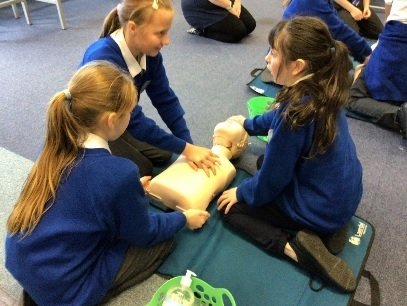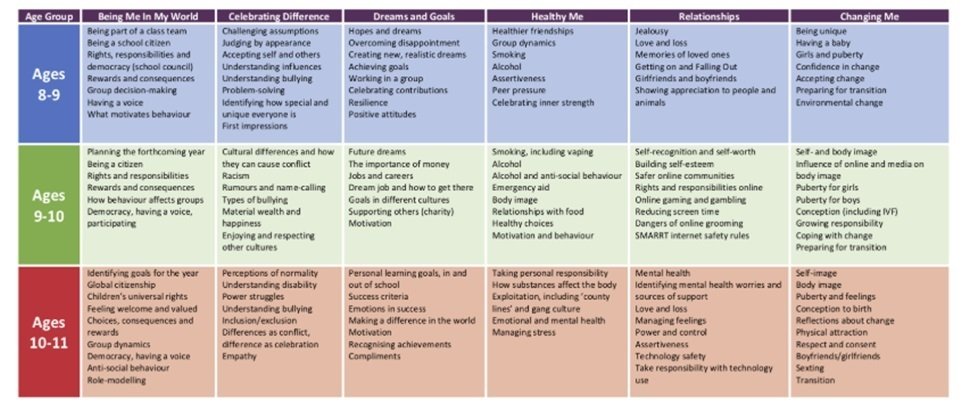PCSHE
Our teaching reflect the key statements for learning in PSHE as explained in the National Curriculum.
In Key Stage 1 we ensure that:
Children can identify and name some feelings (for example through interpreting facial expressions) and express some of their positive qualities. They can demonstrate that they can manage some feelings in a positive and effective way. They begin to share their views and opinions (for example talking about fairness). They can set themselves simple goals (for example sharing toys).
Children can make simple choices about some aspects of their health and well-being (for example by choosing between different foods and between physical activities, knowing that they need sun protection) and know what keeps them healthy (for example exercise and rest). They can explain ways of keeping clean (for example by washing their hands and keeping their hair tidy) and they can name the main parts of the body. Children can talk about the harmful aspects of some household products and medicines, and describe ways of keeping safe in familiar situations (for example knowing how and where to cross the road safely). They can explain that people grow from young to old.
Children can recognise that bullying is wrong and can list some ways to get help in dealing with it. They can recognise the effect of their behaviour on other people, and can cooperate with others (for example by playing and working with friends or classmates). They can identify and respect differences and similarities between people, and can explain different ways that family and friends should care for one another (for example telling a friend that they like them, showing concern for a family member who is unwell).
In Key Stage 2 we ensure that:
Children can demonstrate that they recognise their own worth and that of others (for example by making positive comments about themselves and classmates). They can express their views confidently and listen to and show respect for the views of others. They can identify positive ways to face new challenges (for example the transition to secondary school). They can discuss some of the bodily and emotional changes at puberty, and can demonstrate some ways of dealing with these in a positive way. They can talk about a range of jobs, and explain how they will develop skills to work in the future. They can demonstrate how to look after and save money.
Children can make choices about how to develop healthy lifestyles (for example by knowing the importance of a healthy diet and regular exercise). They can identify some factors that affect emotional health and well-being (for example exercise or dealing with emotions). They can make judgements and decisions and can list some ways of resisting negative peer pressure around issues affecting their health and wellbeing. They can list the commonly available substances and drugs that are legal and illegal, and can describe some of the effects and risks of these. They can identify and explain how to manage the risks in different familiar situations (for example discussing issues connected to personal safety).
Children can explain how their actions have consequences for themselves and others. They can describe the nature and consequences of bullying, and can express ways of responding to it. They can identify different types of relationship (for example marriage or friendships), and can show ways to maintain good relationships (for example listening, supporting, caring). They can respond to, or challenge, negative behaviours such as stereotyping and aggression. They can describe some of the different beliefs and values in society, and can demonstrate respect and tolerance towards people different from themselves.
Pupil Leadership: First Aid Champions
Pupils at SMG have had the most amazing opportunity to train in emergency first aid
and can put their skills into use helping the staff with emergencies.
Five Ways to Well-being
PSHE Watch Me Learn
Parents were invited into school to take part in a PSHE watch me learn session. During this session the parents learnt about how we as a school teach PSHE through our curriculum. They also got the chance to take part in a variety of PSHE based activities with their children in class.
Children’s Corner
https://www.healthforkids.co.uk/
https://www.nhs.uk/change4life/activities
Information for Parents
https://www.healthforkids.co.uk/grownups/
http://www.familylearning.org.uk/balanced_diet.html
| Name | |
|---|---|
| 10-top-tips-for-parents-and-educators-encouraging-open-conversations-at-home (1).pdf | Download |
| 10-top-tips-for-parents-and-educators-encouraging-open-conversations-at-home.pdf | Download |
| 2024_Fire-safe-fact-sheet.pdf | Download |
| 251002-What-makes-toys-safe-flyer.pdf | Download |
| a4-blind-cord-poster-2024-2.pdf | Download |
| a4-nappy-sacks-poster-2024.pdf | Download |
| baby-bath-seat-safety-poster-a4.pdf | Download |
| BB-display-poster-a4.pdf | Download |
| build-emotional-resilience.pdf | Download |
| bullying.pdf | Download |



























